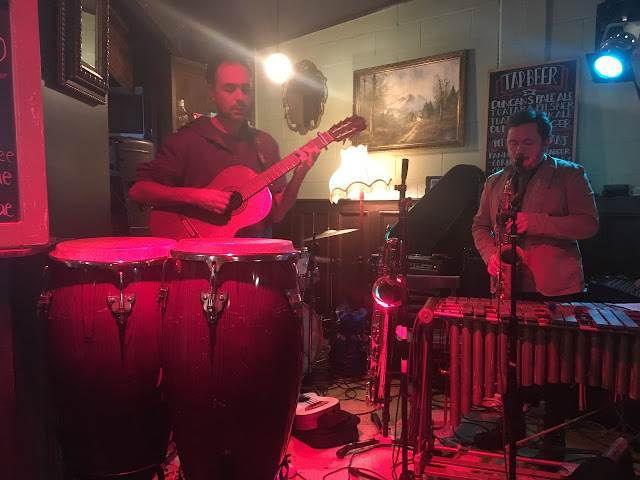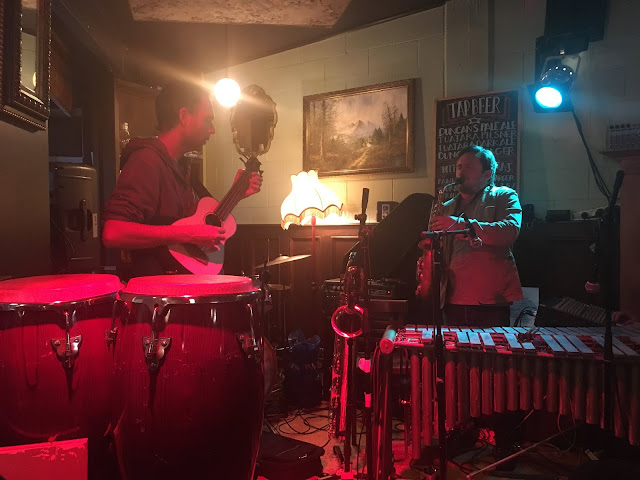I didn't get to nearly enough at the 2019 Wellington Jazz Festival, but I was really happy with the gigs I managed to attend.
Saturday was a full-on evening. I kicked things off at the Third Eye with a first time meeting between pianist Jobic Le Masson and his rhythm section for the evening – Tom Callwood (b) and Anthony Donaldson (d). I would have liked to get to Jobic's quartet gig, but I just couldn't make it happen. But was really I glad I caught this set of improvised music (a 45 minute piece and a shorter one). It speaks volumes of the musicianship of each involved, that they can come together as a unit, and create such an engaging set of music. The piano was percussive and angular, and I really enjoyed how he utilized space (and this was picked up by the rest of the trio). Being the overseas guest, it could easily have been a piano show, but it wasn't. There was plenty of interaction and each of trio had room to move on their own. A couple of standouts from Tom was his use of harmonics (both plucked and bowed) and his solo stretch about half way through the first piece. He and Anthony together are sounding better and better (I've been listening to them as a pairing for 20 years), and I can't recall hearing Anthony play better – power, subtlity, space, swing, interaction – wonderful drumming. It was great to have a standing-room only crowd digging a set of improvised music. You couldn't beat it for $10 – that's value!
After a bite to eat it was over to the National War Memorial Carillon for Ponguru – Al Fraser and Phil Boniface. Again, it was great to see a good crowd present (standing room only). The acousitcs really suited the music and it was nice hearing a bass played sans amplification. I picked up their album, Ponguru, some months ago but I have only given it a cursory listen.
The natural variation of the taonga pūoro is a plus but wanted to hear more variation from the bass (both tonal and approach).
 A group I've been wanting to hear for a while now are The Noveltones. It's an interesting line-up comprised of soprano saxophone (Jasmine Lovell-Smith), bass clarinet (Blair Latham), violin (Tristan Carter) and bass (Alistair Isdale) playing original works by the band members. Pyramid Club was good spot for them – intimate and suitable acoustics – and they played to a full house. I really enjoyed the two tunes I did hear and was dissapointed to leave, but due to the crowded program, I had to bail to get down to Meow for John Pål Inderberg's trio.
A group I've been wanting to hear for a while now are The Noveltones. It's an interesting line-up comprised of soprano saxophone (Jasmine Lovell-Smith), bass clarinet (Blair Latham), violin (Tristan Carter) and bass (Alistair Isdale) playing original works by the band members. Pyramid Club was good spot for them – intimate and suitable acoustics – and they played to a full house. I really enjoyed the two tunes I did hear and was dissapointed to leave, but due to the crowded program, I had to bail to get down to Meow for John Pål Inderberg's trio.
When I ran into Jeff Henderson a couple of month's ago, he mentioned Inderberg's tour and recommended I check him out. When I arrived at Meow I was pleased to see another solid audience. As is often the case at jazz festival gigs there were a lot of unfamiliar faces in the crowd (great! But I do wonder how much of a flow on effect the festival has on the scene the other 51 weeks of the year). I was pleasantly surprised when the set opened with “My Melancholy Baby” and there were a couple from Konitz - “Kary's Trance”/”Play Fiddle Play”, “It's You” and I think “Dream Stepper”. Jeff hand mentioned the influence of Tristano et al, and it was present. You don't hear that influence too much in these parts you it made a very welcome change (likewise it was great to hear a baritone sax specialist). The shtick between tunes was a bit much at times (the crowd seemed to enjoy it) but the music was all business. Håkon Mjåset Johansen (d) Trygve Waldemar Fiske (b) were rounded out the trio and while I was focussing most closley on the baritone, I enjoyed their playing. I picked up the trio's album, Linjedalsleiken,but haven't had a chance to give it a spin just yet – I'll hone in a bit more on the rhythm section then.
As I was leaving I ran into Jobic and mentioned that I had picked up his album (Song) and was intrigued to hear Steve Potts in a setting other than with Steve Lacy. It was great chatting to him and he said how much he enjoyed being in town for the entire festival. I would like to see the festival bring out more players along these lines. Not the star-power, big names, but high calibre players to spend the week (or more) in an artist-in-residence capacity, playing gigs, recording, teaching, and interacting with local players. I think this would be far more productive for the scene than “music of” and “classic album” gigs that plague the festival (there was well over a dozen).
It was back into town on Sunday for the Jazz Kōrero – Talking about Jazz and New Zealand Indentity. The panel was headed by Aleisha Ward and she was joined by Dave Wilson, Jasmine Lovell-Smith, Nick Tipping, Ron Samsom, and four students of Dave's from the New Zealand School of Music. While the conversation didn't contain too much revelatory information, it's nice having the discussion and it's an excellent addition to the festival program. I would have liked at little more room for Q&A and it would be really worthwhile videoing or live streaming future talks. By the time it had wrapped up, the Wellington Jazz Co-Op Sunday Sessions was well under way - it's a regular Sunday afternoon gig that I need to get to. I hung out listening for about 20 minutes and then hit the road.
On the train ride home I wrote these notes on my phone:
If a scene is active, robust and diverse it’s true nature will reveal itself as a byproduct of the activity from those involved. That may be a New Zealand jazz “identity” or it could be could be a number of separate or interconnected, individual identities. Either way, if gaining a New Zealand jazz identity is the goal, the result may be something that is forced, rather than a natural progression. Tokenism is a risk, as is an identity becoming a characterture of itself. If a New Zealand jazz identity does develop, we may very well be unaware that it is happening in the moment.
It doesn’t mean that there aren't things that may help develop identity. Featuring compositions by New Zealanders, awareness of the history, supporting local artists (live concerts, buying recordings, commissions) etc, but again, this can be seen as developing a robust scene rather than developing an identity.
There was a lot of talk about composition - but what about free improvisation? If composition is the only means to an identity, does that mean it is off limits to improvisers?
There was a lot of talk about composition - but what about free improvisation? If composition is the only means to an identity, does that mean it is off limits to improvisers?




